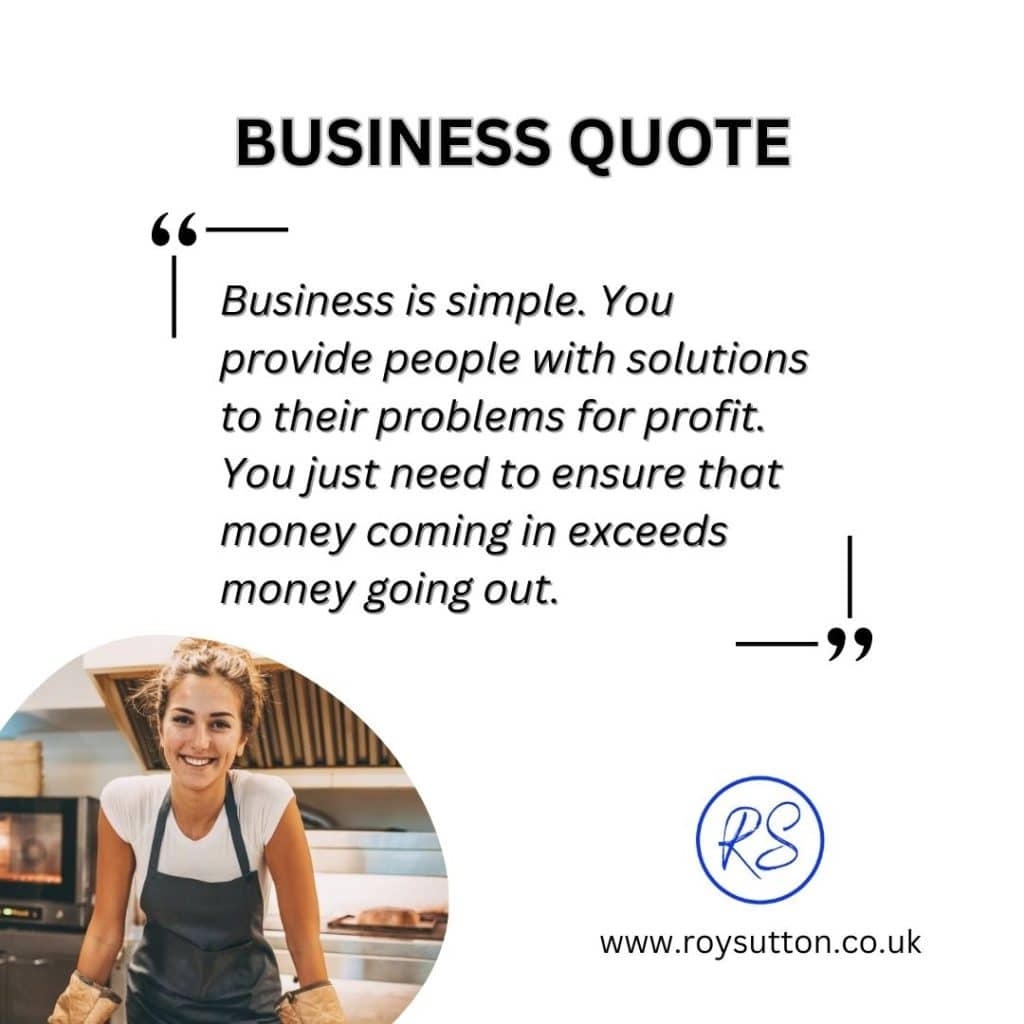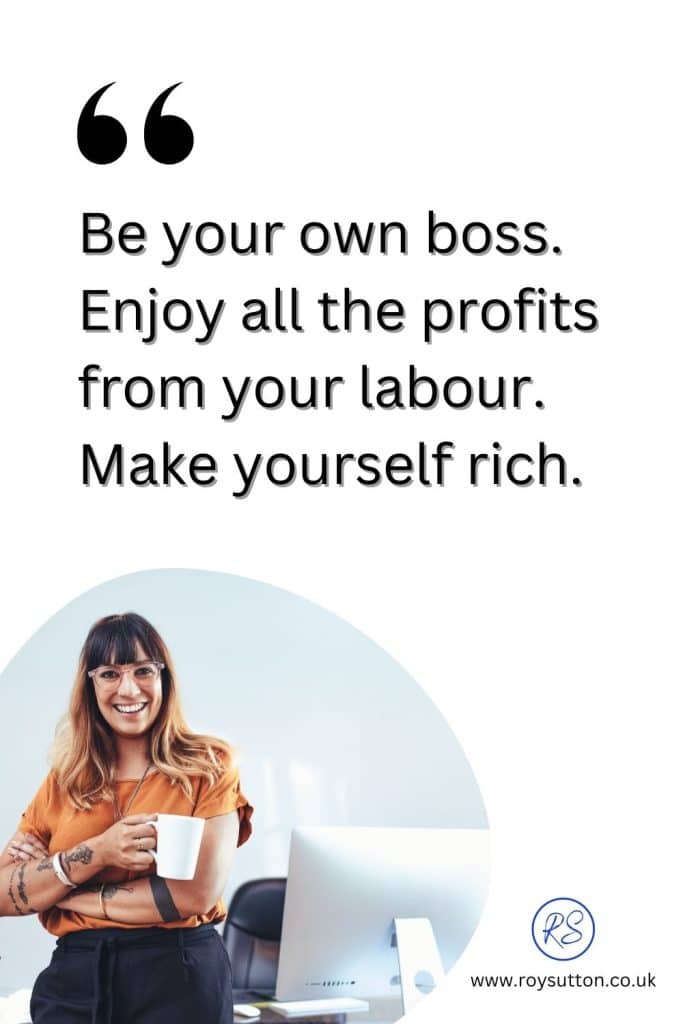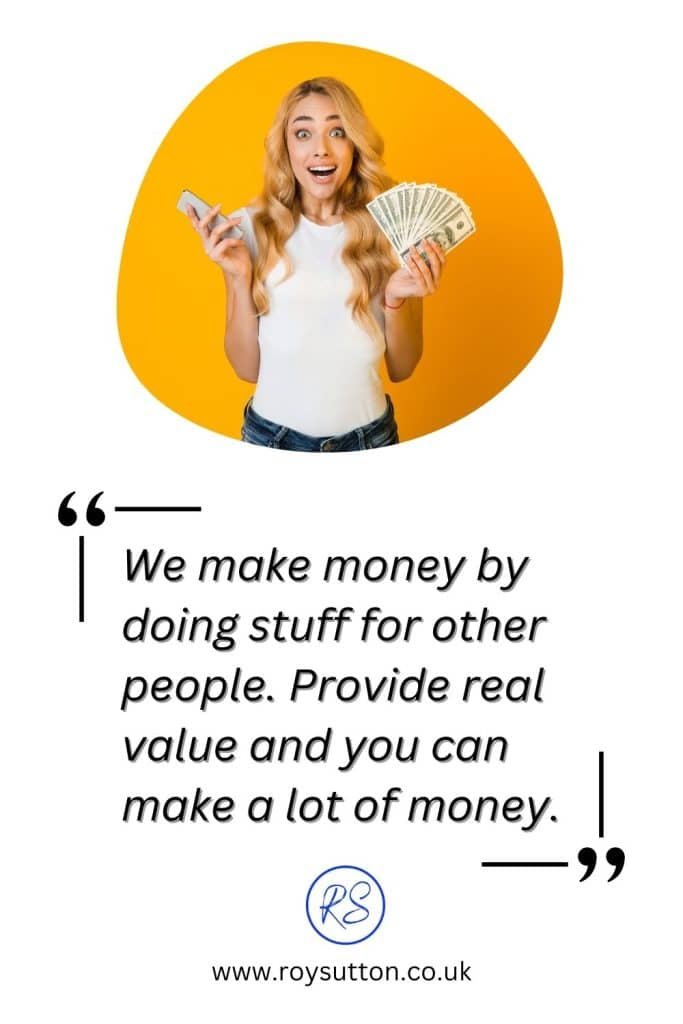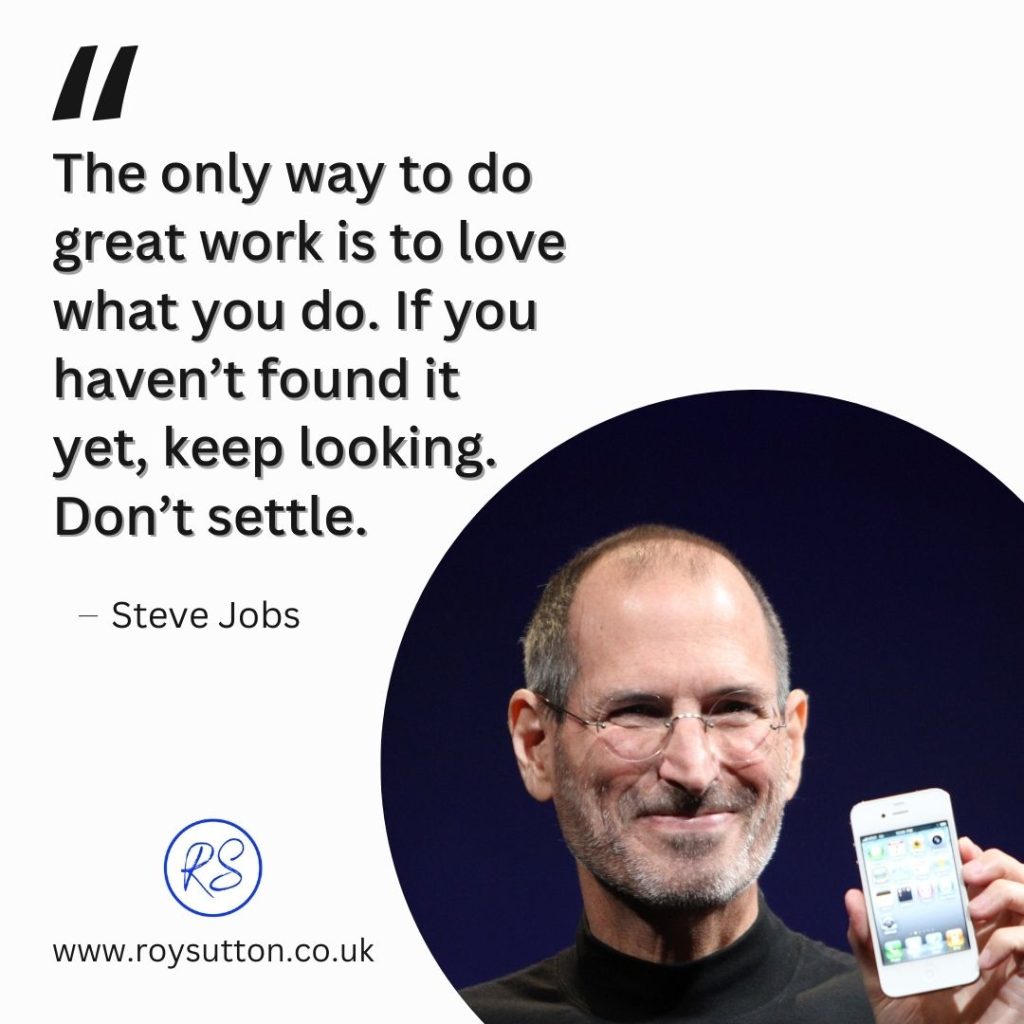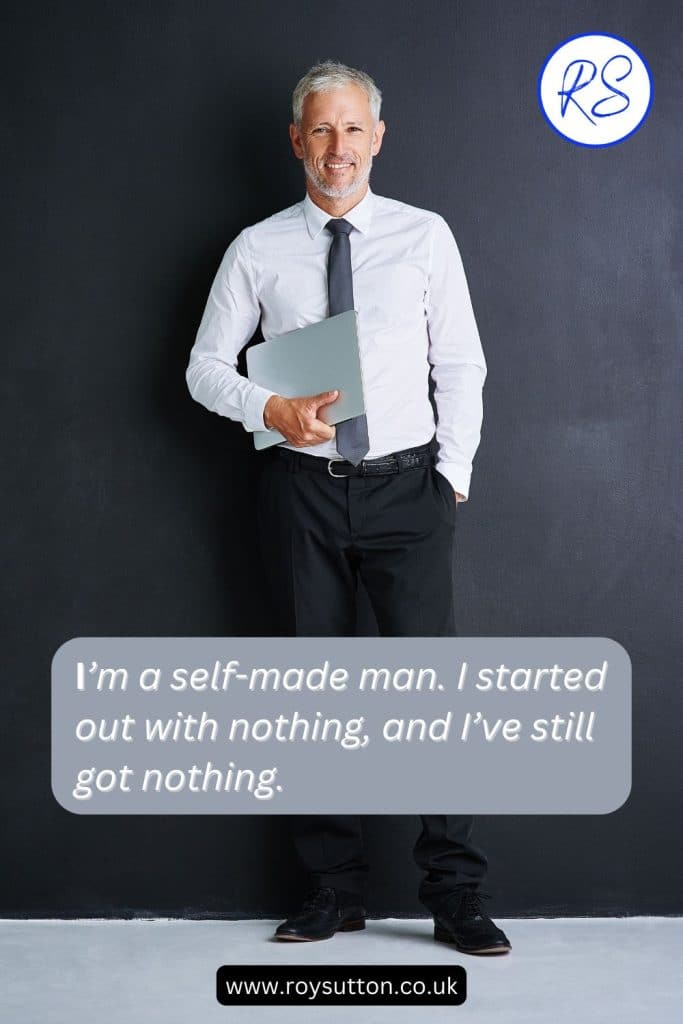
Business tips for success:
I read an article recently about a guy with a college degree who was disillusioned because he couldn’t find a job. At least not one that met his expectations relative to the type of job and income he felt his degree merited.
Well, it’s a tough world out there, as I’m sure you know only too well, dear reader. Despite what some people may think, the world doesn’t owe us a living. The world owes us nothing, and it’s down to us to make a life for ourselves.
Work is just doing stuff for other people in return for money and there will always be people with stuff that needs doing. So rather than seeking a job, perhaps we’d all be better off if we focused on seeking customers for services we could provide.
That’s at the heart of what business is all about, providing people with solutions to their problems for profit, and there’s much to be said for becoming an entrepreneur.
So today let’s explore some business tips for success, for all those wannabe entrepreneurs.

The advantages of self-employment:
There are many advantages to being self-employed.
For instance, not having to deal with office politics is a big advantage.
And of course, being the beneficiary of all of the proceeds of your hard work is another good reason.
Instead of making a lot of money for other people, you could be making it all for yourself. The harder you work, the more you make for yourself too.
Unless you’re a lawyer or an investment banker, the chances are the only way you’ll ever make serious money is through building your own business. Building a business that, perhaps, you’ll be able to sell for a lot of money one day.
However, remember this; you might think that if you’re self-employed then you’re your own boss. Well, that’s not true. The customer is the boss, always.
Serve customers badly and you won’t be serving them for very long, that’s for sure.
The first rule of business is that you must know your customer.
You must gain a deep understanding of the products, services, and marketing that will appeal to your target customer.
One size will not fit all and each market will require a different approach.
Now going into business is not for the faint-hearted. You must be prepared to work very hard, at least in the early days, when you’re trying to establish your business.
However, if you can provide your target customers with real solutions to real problems then you can make serious money.
If someone else is already offering a solution to the target problem, then your solution must be better or cheaper than theirs in some way, if it is to sell.
Creating great products and offering great customer service is the route to business success.
However, never forget your reputation and image. These things matter too.
Make sure you create an image that will appeal to as wide an audience as possible. Running your own business will be a challenge but it can also be extremely rewarding, both financially and in terms of a sense of achievement.
Remember also that running a small business is not a whole lot different to running a large business. The only real difference is one of scale. The key issues are always the same.
So here are some top business tips for success for would-be entrepreneurs:-

Top business tips for success today:
1. Control your costs:
Of the many business tips for success I could suggest, none can be more important than keeping an eye on the money.
Money comes into your business and money goes out. It’s that simple.
However, if you fail to ensure that the former is always greater than the latter, at least for most of the time, then trouble will follow at some point, whatever the size of your business.
Big businesses might be able to weather the storm a bit longer but the consequences of expenditure consistently exceeding income will be the same. Keep losing money and eventually, your business will go bust.
Take every opportunity to maximize your revenue and always keep your costs as low as you can. And never, ever lose sight of cash flow.
Don’t spend money unless it is necessary.
Ask yourself, do I need to spend this money? What will I get in return? Can I achieve the same result at less or even no cost?
It might surprise you to learn how frequently it is possible to avoid the cost, whilst still doing all the things big businesses do.
The key message here is that you must keep an iron grip on costs and you must manage cash flow carefully.
2. Do your own market research:
Every product should solve a problem for your customer and you should have some idea of what that problem is and how your product will solve it relative to other products offered by your competition.
Just because you think you’ve got a great product, doesn’t mean customers will see it that way. Your opinion means nothing if there are not enough people willing to buy your product at the price you want to charge for it.
If your product won’t sell then potentially your business could be in trouble.
Perhaps you think you’ve spotted a gap in the market?
If it’s a genuine gap then you might be on to a winner. However, a gap in the market doesn’t always guarantee that there is a market within that gap. Maybe there’s a reason for the gap which you’ve yet to understand.
In business, the trick is to find out what people want and then offer it to them.
How do you find that out?
One very good way is simply to ask them yourself.
I’m not referring to your family and friends here. They’ll be far too polite to give you any meaningful feedback.
You must talk to real customers, if and when you have them, and potential customers.
You can conduct some of your own market research in your local shopping mall or wherever you think your target customers might congregate. And don’t be shy. Only by talking to people can you confirm whether your ideas have real potential.
So, identify some basic questions, stand there with a clipboard and just start asking people, as politely as possible.
Often people will be far more helpful than you might expect.
And don’t forget you can always use the Internet too.
Search engines like Google have keyword search tools that are free to use. These tools allow you to get a ‘rough and ready’ measure of what people are searching for and how frequently.
And don’t forget social media. Facebook, Twitter, Reddit, and Quora, for instance, can be great channels for asking questions, so you can gauge what people think.
Market research doesn’t have to be expensive. As a small business entrepreneur, it is possible to do it yourself. You don’t have to spend a lot of money on this activity, but you must do it.
Your results might not be quite as scientific as those produced by professional market research people, but they will provide you with a rough guide and that’ll probably be good enough in the first instance.
3. Advertising costs money: is there a better way?
Another of the most important business tips for success has to be visibility. I cannot stress highly enough that visibility matters, both for your business and your products. It’s crucial.
Your products might be the best in the world, but they won’t sell at all if potential customers have no idea they exist. Surely that much is obvious.
The question is, how does any business ensure that customers have visibility of its products? The obvious answer is advertising of course.
However, media advertising can be costly, and it’s a cost that new businesses often cannot afford.
One small advert in the back of a glossy magazine can cost you a lot of money and yet you have to ask yourself whether that would be money well spent.
How often do you notice the small advertisements on the back of a magazine? In my case, the answer is not very often.
With so many advertisements competing for my attention, I tend to filter them all out. I’m willing to bet that you do too dear reader.
So, if you’re not careful, money spent on advertising can be money wasted in my experience.
A better approach might be to use some creative thinking with a focus on public relations.
Smart entrepreneurs know that business is show business. It’s all about getting noticed.
For example, the entrepreneur Richard Branson is a brilliant exponent at getting media attention at little or no financial cost to his business.
It helps that he’s a likeable guy, of course, but he’s also clever and creative in his approach.
If you have an interesting back story, perhaps the local press, local radio or even television might be willing to run a story on you and your business and the products you have to offer.
Social media can be a powerful medium for gaining attention for your business too.
Social media is also a useful way of driving traffic to your company’s website, particularly Pinterest, which is an incredible tool, in my opinion.
Then there’s using search engine optimization (SEO) techniques on your website content to ensure you drive traffic to your site from the search engines.
Let’s face it, you do need to appear on the first page of a Google search if there’s to be any chance of anyone noticing you and your business through search queries. So, if you can optimize your website for SEO, then you can get enormous amounts of traffic from Google and other search engines, like Bing and Yahoo.
Make sure you offer visitors to your company website the opportunity for signing up for a regular email newsletter. And give them the incentive to sign up.
This could be a free report or perhaps a discount code for one of your products.
How about running a competition using your company’s fan page on Facebook or your company website?
The price of a smartphone or a Kindle or other desirable electronic device as a prize would be cheaper than the cost of a small advert in a glossy magazine, but it’s more likely to get noticed and it’ll probably generate a lot more excitement.
If you have a car or van, don’t forget that it can be emblazoned with your company logo, your website details and product information on the back, sides and front. Even on the roof.
It would be free advertising as you’re driving around.
Park your vehicle at a big event attended by thousands of people and you’re beginning to master the art of guerrilla marketing.
The bottom line is that creative thinking and public relations can produce powerful results in your quest for visibility at a fraction of the cost of advertising. The key message is, be creative.
4. Don’t make yourself indispensable:
The biggest mistake any entrepreneur or business manager can make is to think that every decision should be made by them.
If you’ve started a business from scratch, you tend to form an emotional bond with it. It becomes your baby and you become very protective of it.
That’s natural of course, but as the business grows you’ll have so many things to do that you couldn’t possibly do them all.
You could try, of course. However, if you try to do everything you’ll find yourself falling behind in key areas like product sourcing, sales, and keeping your accounts up to date.
Fall behind, and it becomes very hard to catch up. Potentially it is also very damaging for the business.
So you have to learn the art of delegation.
A good start would be to document every task and process within the business and then create an Operations Manual. This can include everything from the preferred method for answering the phone to completing invoices and dealing with complaints.
It can also include the degree of flexibility which you are delegating to staff, so they can get on with basic tasks allowing you to get on with those activities which are much more important for achieving business success.
No business should be dependent solely on one person.
If it is, and that person gets seriously ill or has an accident, then obviously the business would be in trouble very quickly and it would struggle.
Delegate basic activities to your staff and you can be sure that the business will continue to function even when you’re not around.
It will also give you a bit more thinking time for steering the company towards bigger and better things.
The key message here is that you must delegate. Never delude yourself into thinking that only you can do a particular task.
5. Charge sensible prices:
If you’re to earn a decent income then any list of business tips for success must stress the importance of knowing the value you can add and know your worth too.
It’s easy when you’re a small business to undervalue your products and your time. The result is that you undercharge for what you have to offer.
This is particularly true when professionals are selling their expertise and time based on a consultancy arrangement.
It’s common for first-timers to lack the confidence to charge what they might perceive to be a high rate for their services.
The problem is that selling things cheaply can be counter-productive because customers then think they’re getting an inferior product or service and can be put off.
It is a fact that price can often be used as a proxy measure for quality when your business is being judged.
You have to be very business-like when considering the pricing of your products and services.
So look at what your competitors are charging and then analyse where you think your products and services fit into the market.
If you struggle with that idea, then you can always seek guidance from someone else, like a fellow business owner or your accountant.
However, you must always remember that you must believe in your products and services. If you don’t, then why should anyone else?
You must project confidence.
If you don’t have the courage of your convictions, then the chances are that your business will never succeed.
Believe in yourself and charge what you’re worth. Sell yourself based on the value you bring and the value you can add.
6. Make the best use of technology:
Sometimes small business owners think that because they are small they can only act in a small way. However, that can be a mistake.
Don’t be afraid to invest in your business. For instance, investing in up-to-date technology like the right phone system and websites, doesn’t have to be expensive but they can be the difference between a customer contacting you or not.
These days no business, large or small, can operate without a website.
And that website needs to be as user-friendly as it possibly can be.
Make sure your website provides customers and potential customers with the opportunity to sign up for a regular email newsletter. And as suggested earlier, offer them an incentive so they do sign up.
Ensure also that your telephone system allows customers to reach you at their first attempt. Certainly, customers won’t make too many attempts to call you before they’ll simply go elsewhere.
If you don’t know how to do all this yourself, then go on a course or seek guidance from someone with the right expertise.
Good communications will pay handsome dividends over time.
7. Set goals:
Another in this list of business tips for success, that I want to stress here, is the importance of goal-setting.
You have to know what it is you’re trying to achieve if you’re to have any chance of successfully achieving it.
Never set your sights too low either. Set yourself a challenge and then put all your energy into achieving it.
Once you’ve set a goal then you need to establish a plan as to how it is going to be achieved.
For instance, if your goal is to achieve a certain level of turnover over the next year, you have to break that down into the small steps you will need to take for it to be achieved.
How many sales will you need to achieve each day, each week, and each month?
What implications will those sales targets have for production?
Do you have enough sales staff to generate that amount of business?
And so on.
Always create a plan and review it regularly, making adjustments as and when necessary.
8. If you got a great idea, then do something with it:
How many great ideas never see the light of day because the person with the idea fails to do anything about it?
And how many times does someone with an idea see someone else come along with the same idea and beat them to market?
Let me give you an example. Two years ago I thought up a great idea for a tee shirt slogan. However, I was busy and so in the end I didn’t do anything about it. Fast forward two years, and the other day I noticed one of the best-selling teeshirts on Amazon was one bearing the slogan that I’d thought up.
Someone else had the idea too, but they did something about it. And they’re now benefitting from the income generated. From my standpoint, a great opportunity was missed.
Procrastination stops many entrepreneurs from cashing in on a great idea. Don’t let this be you.
If you’re waiting for the perfect time to do anything, you will be waiting for the rest of your life. Now is always the perfect time to start.
Don’t wait until you think the economy will be better or your children have left home or some other arbitrary barrier.
The right time to start your business is right now.
So go for it. Yes, you’ll make mistakes. You won’t get everything right the first time. You won’t become an instant millionaire either.
However, by getting started you’ll be heading in the right direction and you’ll learn along the way.
Hard work combined with implementing good ideas will get you there eventually.
Concluding Remarks:
I hope these business tips for success prove useful to you, dear reader.
However please note, this blog post was not intended to be a comprehensive guide for entrepreneurs.
You’ll find many excellent books on the subject and I recommend that you make a point of reading as many of them as you can because educating yourself is always a good idea.
It doesn’t have to be formal education. Self-education can be just as good in practice. And then, of course, you can start creating your list of business tips for success.
And the best form of education, in my experience, is to learn by doing. You will make mistakes but the lessons learned from those mistakes will be far more valuable to you than anything anyone can teach you in a classroom.
Being an entrepreneur can be a roller coaster ride but it can be a fantastic and enriching experience too. So if it appeals to you, go for it.
Please share this post with your friends:
If you found these business tips for success useful, then please share them on social media with your friends. When you share, everyone wins.
So go on, please share this post now. If you can do that for me, I’ll be forever grateful and you’ll be helping a keen blogger reach a wider audience.
Thank you for your support, dear reader.

Other articles you might find interesting:
- 10 tips for improving self-esteem
- Why passion is the key to success
- How to handle criticism at work effectively
- 3 ways for getting rich
- 5 ways to kill your dreams
- 33 life lessons learned that are best learned early
- How the power of words can change lives
- 10 steps for making new year’s resolutions
- Public Speaking: The Power of the Pause
- Productivity Tips: How to Structure Your Day
- George Carlin’s Top 10 Rules For Success
- 4 cornerstones for how to speak so people will listen
- A Motivational A – Z Guide to Success
- Have the courage to step out of your comfort zone
- 3 of life’s lessons learned that you really should know
- Valuing people must take precedence in the modern age
- Top wealth creation strategies for financial success
- Why an investment in knowledge pays dividends
- 13 tips for improving your personal happiness
- Steve Jobs’ Top 10 Rules For Success to inspire you
- 25 inspirational stories of people going from rags to riches
© Mann Island Media Limited 2025. All rights reserved.

